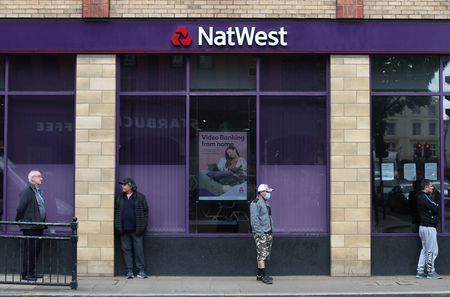
By Iain Withers and Lawrence White
LONDON (Reuters) -British bank NatWest posted better than expected profit for the first three months of 2023 as income soared 37%, even as inflation hammered households and fierce pricing competition squeezed the bank’s customer deposits.
NatWest reported pretax profit of 1.8 billion pounds ($2.25 billion) for the first quarter, above the 1.6 billion pound average of analyst forecasts compiled by the bank and the 1.2 billion pounds achieved a year earlier.
Like rival Barclays, which reported results on Thursday, higher interest rates continued to lift the bank’s revenue.
But the higher rate environment does pose challenges for lenders and NatWest blamed a 19.8 billion pound outflow in deposits partly on fiercer pricing competition as well as its disposal of Ulster Bank.
Deposit levels at banks have attracted closer scrutiny after the rapid collapse of U.S. lender Silicon Valley Bank sparked jitters across the global banking sector and highlighted how quickly customers can shift money in the digital era.
NatWest chair Howard Davies, who plans to leave the bank by the middle of next year, this week said that “poor risk management” was largely behind recent bank failures and that NatWest remains resilient.
Bank investors are also wary that inflation remains stubbornly high in Britain, squeezing household budgets and raising the risk of borrowers falling behind on loan repayments.
High prices also raise the chances of Bank of England interest rates staying higher for longer, pushing up borrowing costs and further crimping consumer spending power.
State-backed NatWest set aside 70 million pounds to cover potential loan defaults, compared with a small release of cash reserves the previous year, but it said loan arrears remained low and the charge was below the 144 million pounds booked in the previous quarter.
“By monitoring customer behaviour and looking closely for signs of financial distress we are able to put in place proactive measures to help those who are struggling right now,” Chief Executive Alison Rose said.
($1 = 0.8013 pounds)
(Reporting by Iain Withers and Lawrence WhiteEditing by Sinead Cruise and David Goodman)

